ORLANDO, FL –– French automotive supplier Forvia Group is taking steps to accelerate the development and delivery of recycled compounds for the automotive industry in North America.
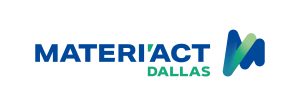
Formerly known as Faurecia, the company –– the world’s seventh-largest auto supplier –– created a sustainable materials subsidiary called MATERI’ACT in 2022 to further this cause, and in February formed a joint venture in Dallas with PCR Recycling. The aim of the JV is to help secure a steady supply of recycled materials.
Called MATERI’ACT Dallas, the new venture is just the latest move by the firm to develop and deliver recycled compounds that can help to reduce carbon dioxide emissions for automotive products by 85 percent by 2030. Forvia, as part of its Scope 3 objectives, says it plans to integrate 70 percent of recycled plastics into its interior automotive products by 2030.
At the time of the JV’s launch, Forvia stressed how this new strategic partnership marries the strengths of both companies. “PCR Recycling brings capabilities in accessing sources of recycled plastics,” it said, “while MATERI’ACT contributes its expertise in refining, adaptive formulations, compounding, and post-processing capabilities. Together, we’re poised to transform the industry.” Their stated goal: To ignite demand for recycled plastics in North America.
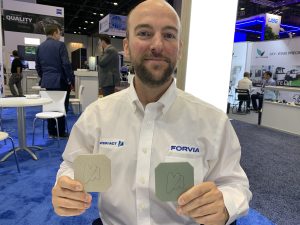
In a May 6 interview at the NPE 2024 expo in Orlando, two of the company’s executives shared their visions for the effort. J. Leo Mazurek, general manager of MATERI’ACT North America, said that “most companies, especially automotive tier ones, and our OEM customers have defined different dates by which they want to be net zero. For us, it’s 2045.”
Materials are key to reducing carbon footprint
Tackling the question of sustainable materials is core to achieving any such goal, he said. “You must address materials if you, if any company, ever wants to meet their emission factor reduction goal.”
The Nanterre, France-based Forvia, whose roots (as Faurecia) trace back to 1914, has the heft to move the needle. The company says it is number one among auto suppliers for vehicle interiors and emission control technology. The company equips one of every two automobiles made.
Discover Prospector Premium, learn more here!
French vehicle manufacturer Groupe PSA was a majority shareholder in Faurecia until 2021, when it merged with Fiat Chrysler to form Stellantis. Faurecia then became independent and acquired a controlling interest in Hella, after which the entity rebranded as Forvia. The company reported 27.3 billion euros in fiscal 2023 sales.
Launching MATERI’ACT
In 2022, Mazurek said, the company “decided to create a separate division, a separate legal entity, MATERI’ACT, where we create sustainable compounds, whether it’s bio-based plastic compounds, or recycled plastic compounds. Although Forvia is intended to be our largest customer,” he added, “we certainly don’t discriminate. We’ll sell to anybody.”
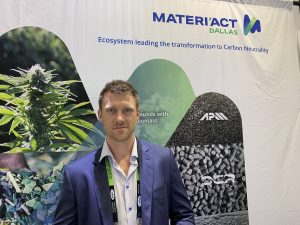
Wojtek Zarzycki, CEO of MATERI’ACT Dallas, comes into the venture after having led PCR Recycling. He noted how the industry in North America tends to recycle more polyethylene than polypropylene. “Now,” he said, “as we partner with Forvia, we’ve started focusing more on the polypropylene side” –– both homopolymer and copolymer grades.
The Dallas operation, with 20-some employees at the moment, is aiming to install additional lines by 2025’s first quarter and to produce more than 60 million pounds a year of recycled resins. While Forvia’s focus is on first making the Texas JV a success, it clearly has its sights set on creating similar regional ventures around the U.S. Such expansion will be market dependent, Zarzycki said.
MATERI’ACT/Forvia has been active in several projects aimed at advancing the use of recycled compounds. Just this April it said it had signed a letter of intent with Gree Green Recycle Resources, a unit of Zhuhai Gree Electric Appliances Co. Ltd., a leading Chinese home-appliance maker. The deal calls for the firms to set up, by the end of this year, joint ventures to develop, manufacture and sell recycled plastics. Their goal is to sell 150,000 tons of compound by 2030.
Using ocean-bound plastics
Forvia also has developed a concept car integrating instrument and door panels made with ocean-bound plastics (OBP). This is in the form of a partnership between the Forvia Foundation and Plastic Odyssey, a non-governmental organization that supports local communities in the collection, treatment and recycling of OBP. Forvia serves as a sort of R&D adviser in this arrangement, while also benefiting from the feedstock source.
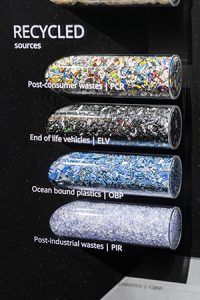
Earlier this year MATERI’ACT revealed a vehicle door panel where black virgin materials were replaced by a deep blue engineered experimental compound made of plastic material collected by Plastic Odyssey on beaches in northern Africa, and oyster shells.
In March, at Forvia’s Sustainability Day event in France, it displayed a complete cockpit interior with four door panels and one instrument panel integrating OBP. “The combination of OBP and biomass allows a 20 percent reduction in CO2 impact,” the firm said, “opening the path toward MATERI’ACT’s target of up to 85 percent CO2 reduction.”
Integrating natural fibers
It integrates up to 20 percent of recycled OBP into a compound material in the firm’s NAFILean Vision range, which stands for “Natural Fillers for Lean and Visible” design. In this case, the bio-based fillers are oyster shell particles.
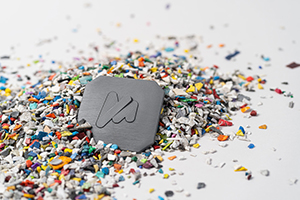
Forvia notes that one can maximize the decarbonization of plastics by combining low-carbon, recycled plastics and renewable, bio-based fillers that can also sequester CO2. This also reduces the need for post-processing with paint or film in automotive applications, further lowering both the carbon footprint and the cost.
Ocean-bound plastics present a potential source of recycled feedstock, supplementing other sources such as post-consumer recycled (PCR), end-of-life vehicles (ELV), and post-industrial recycled (PIR).
Meanwhile, last fall Forvia introduced Ecorium, which it describes as a low-carbon alternative to animal leather for use in vehicle trim. It is made from recycled PET bottles, combined with a micronized hemp in the coated layer. Automaker Renault plans to use this material in its all-new Rafale model, which is just hitting the market now.
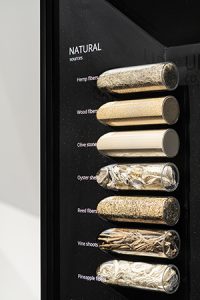
Biocomposite in an instrument panel
Meanwhile, in its 5 E-Tech electric city car model, due to go on sale this fall, Renault also is using NAFILean-R in its instrument panel. NAFILean-R is a biocomposite incorporating 20 percent natural hemp fibers with a matrix of fully recycled PP from post-consumer waste. MATERI’ACT partnered with recyclers Veolia and APM on this material, which is said to slash CO2 emissions by 73 percent together and reduce part weight by 20 percent –– all without compromising on stringent specifications for resistance, crash safety, and cabin air quality.
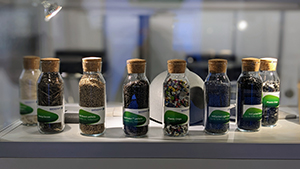
Asked if automotive OEMs are demanding these sustainable materials, Zarzycki said yes, that even in the absence of rules in the U.S., there are regulations being drafted in Europe, and the international OEMs are starting to adopt such guidelines in North America, as well.
And so the efforts to develop the sustainable materials market for automotive continues. “Compounding is difficult enough,” notes Zarzycki. “And then you do recycled feedstock, which has its variability and that makes it 10 times more difficult. And so merging the two is really the hard part to bring into the market.” But Forvia, via MATERI’ACT, is on a mission to do just that.
The views, opinions and technical analyses presented here are those of the author or advertiser, and are not necessarily those of ULProspector.com or UL Solutions. The appearance of this content in the UL Prospector Knowledge Center does not constitute an endorsement by UL Solutions or its affiliates.
All content is subject to copyright and may not be reproduced without prior authorization from UL Solutions or the content author.
The content has been made available for informational and educational purposes only. While the editors of this site may verify the accuracy of its content from time to time, we assume no responsibility for errors made by the author, editorial staff or any other contributor.
UL Solutions does not make any representations or warranties with respect to the accuracy, applicability, fitness or completeness of the content. UL Solutions does not warrant the performance, effectiveness or applicability of sites listed or linked to in any content.
